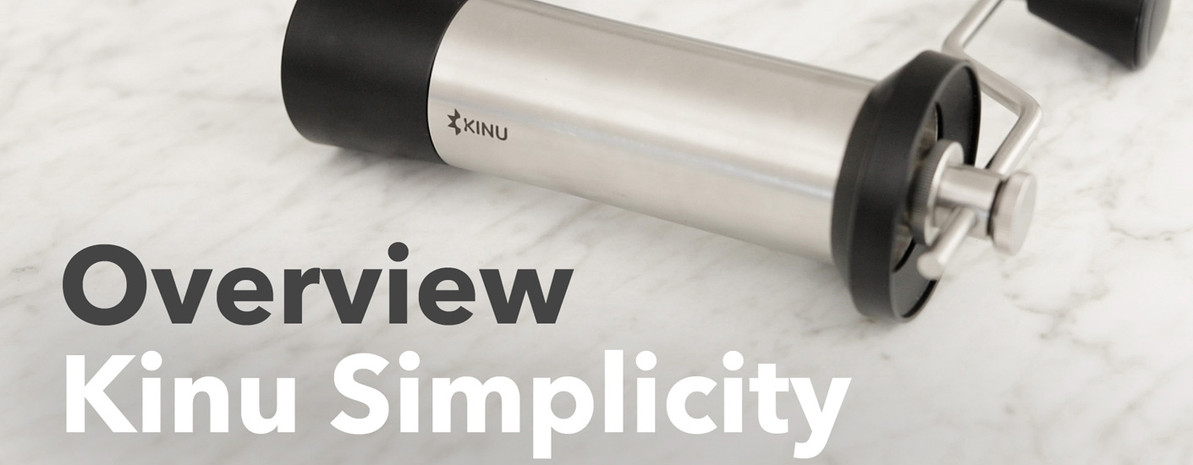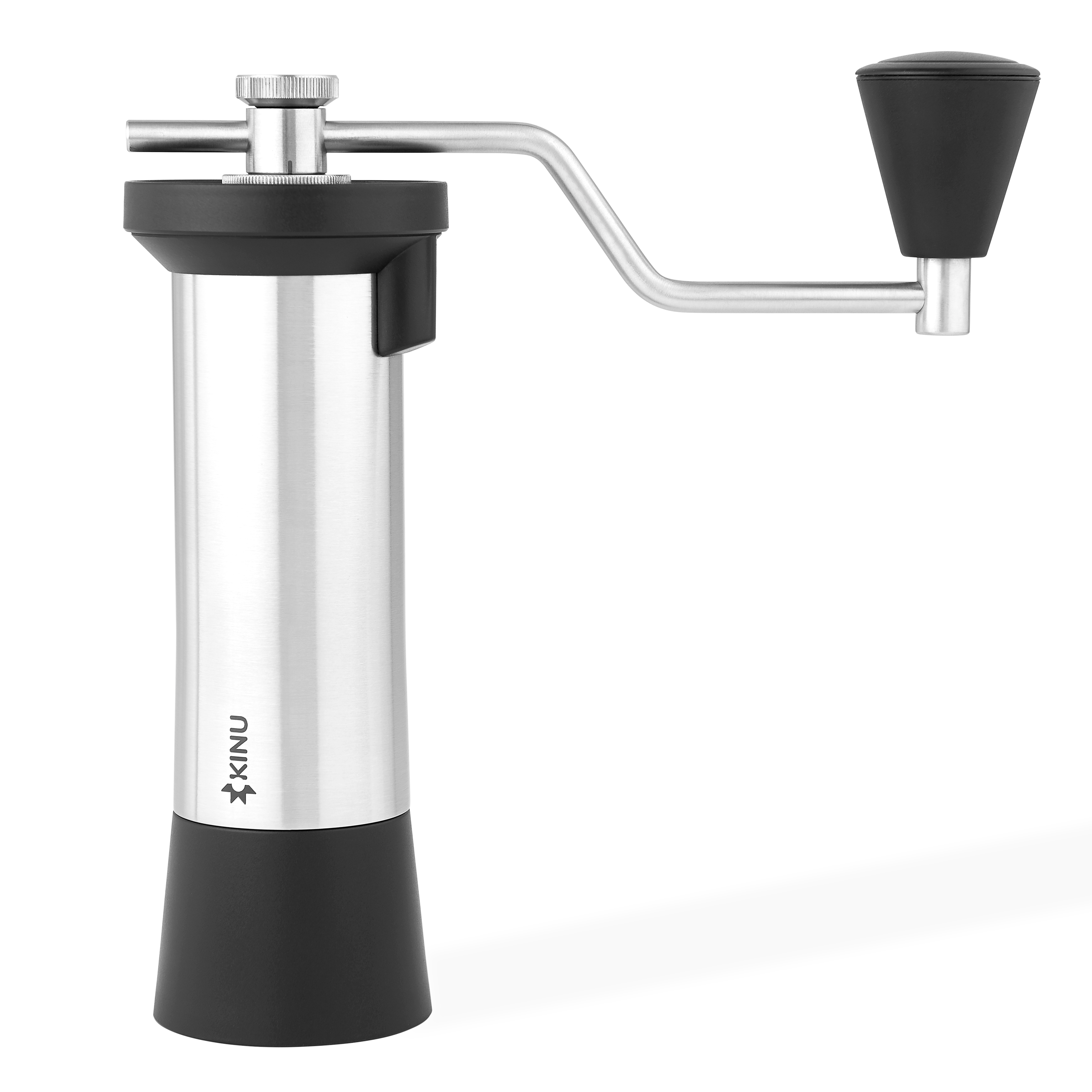Video Overview | Kinu M47 Simplicity Manual Coffee and Espresso Grinder
In need of a robust and travel-ready hand grinder? Here's one for your consideration: the Kinu Simplicity features 47 mm conical steel burrs, precision grind adjustment, and plenty of grind range for your brewing needs. Take a look as we cover the features and performance of the Kinu Simplicity.
Transcript
Hey, folks. It's Steve with Prima Coffee. Today we're taking a look at the Kinu M47 Simplicity hand grinder. Like Kinu's other M47 line of grinders, this is a very well-built hand grinder. It's got a lot of awesome features packed in and it's sort of over-engineered, to be honest, as a hand grinder. It's got a great heft to it with a steel body, steel internals, really well aligned and precisely machined parts. And essentially, the way that the Simplicity fits into their lineup is somewhere between the M47 Phoenix and the Classic M47. This grinder comes with their standard coated 47-millimeter steel conical burrs. A coarse burr meant for pour over brewing is available to swap out, but the Simplicity that we have comes just with the standard. And the main differences you'll notice between this and the classic M47 is just the inclusion of some plastic parts. So we have an ABS plastic catch cup, we have an ABS plastic upper funnel, we still have the thumb stop, and then we have a slightly different plastic knob or pommel on the handle.
Kinu M47 Simplicity Manual Coffee and Espresso GrinderFeatures 47 mm conical steel burrs with Black Fusion treatment
Featured Product
Almost everything else is the same. You still have the steel body, steel struts in the middle or in the interior, steel drive. Also, the burrs are exactly the same, the adjustment is exactly the same. One of the other main differences with the Simplicity is we no longer have the clicky adjustment wheel. Whereas there used to be a sort of detent and a ball bearing that would click as you turn and as you make adjustments, this is actually smooth and clickless, more or less. The adjustment mechanism has 50 marks per rotation and each mark corresponds to 1/100 of a millimeter of burr travel. So that means that you can, more or less, have a solid metric for understanding how much rotate or how much adjustment distance happens every time that you rotate a certain amount of rotations or parts of a rotation. That's just handy to know. Usually, you're making grind adjustments relatively like, "That brew went a little fast and I need to slow it down, so I will grind a little bit finer."
Like the other M47 grinders with the standard burrs, their best use in our opinion is for espresso, that's where the best flavor clarity is. They do a really good job of dialing in for espresso and with this nice long handle and the burr design that they have, grinding for espresso really isn't that much of a chore. You can get through a dose usually in about maybe 40 to 50 seconds of grinding even at that espresso fineness. You can take it down to Turkish if you like, as well. It takes a little bit longer, it's a little bit more labor, but it's possible and you can get pretty good flavor out of Turkish brews. As you start to go a little bit coarser into drip brewing, we find that the best flavor is in small maybe like a single cup V60 and that's because as you go coarser, you start to see more and more fines building up, which is going to muddy the flavors. It's actually going to muddy the brew bed a little bit too. You'll start to see a little bit more kind of silty appearance in the actual brew bed at the end of your brew. It's not a bad drip grinder, it's just that we think that other burr sets are probably preferable and that's actually where that coarse burr comes in. So it's nice that that's available now.
So where the standard burr really excels is in that espresso range. And up to smaller drip brews, we think a V60 is probably the best, a small Kalita Wave is possible really going up to doses of like 15 to 18 grams. Once you get into 20 to 25, again, you start to see that mud and it's not the greatest flavor. So let me give you a little bit of a demo on grinding. I've got 20 grams of beans here and I'm going to grind at a V60 setting. So what I've done is I've set the adjustment at four full rotations from zero. And zero in this case, unfortunately, is not zero on the dial. It's actually, for this particular grinder, a two on this dial. It may be different for another one. So the burrs do not necessarily zero at zero anymore. So four full rotations from that zero point. I'm grinding 20 grams of coffee and it's pretty easy. It's really not that hard, especially at this drip setting. But like I said, going down to espresso, you can grind 18 grams in really not that long, 30 to 40 seconds.
Usually, a small drip brew is right around a minute, minute and a half, which is a pretty nice amount of time to be grinding. After a minute or so it starts to get a little tiring. If you're not doing this every single day, or even if you are, it can be just a little bit tiring. The rotation is really nice and smooth. We have nice steel bearings inside that keep a good smooth rotation going and everything's well centered. So you don't really have too much of like sort of the mechanics of the grinder working against you. So as you can see, that went pretty quickly. And I'll give you just a sense of what this grind quality looks like here. Again, at this sort of fine V60 grind, you can start to see a little bit of those fines building up, but overall it's still fairly uniform. And again, it was pretty quick work for that V60 grinding. Something you might notice is because of this, and I'm kind of leaving a mess here, you do have some static buildup because of this ABS plastic. If you're using lighter roasts or, you know, it's kind of a dry environment, here in the winter in Kentucky it can get kind of staticky and dry anyway, so we tend to see more kind of static building up when we're grinding anything.
But with that plastic and with a lighter roast, you'll probably see some clinging grinds or chaff, which could be a nice thing kind of keeping those fines sort of stuck to the grinder, but it also leads to a little bit more mess. So that's just something to keep in mind. Overall, the build quality is still excellent, just as every Kinu product that we've brought in has. If you don't mind a little bit more plastic, it's a really good alternative to some of the other grinders that they have. The plastic does help reduce the weight. Overall, the M47 Simplicity comes in at about two and a half pounds or 1,150 grams. Really, overall, it's another fantastic product from Kinu. We love it. We really love the grind quality. And now that you have burr options, you can kind of use it either for espresso focus or more of a drip focus, and still have this great grinder product. So that is the Kinu M47 Simplicity. Thanks for watching.




